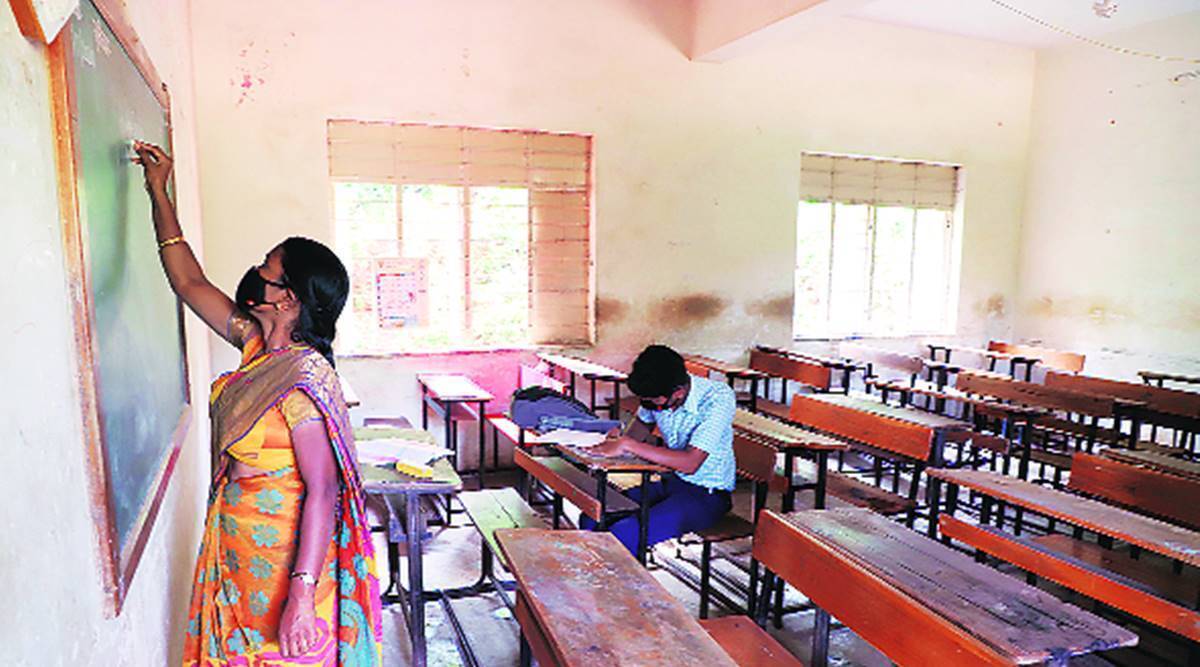 Patil said it is inappropriate to corner teachers alone for the quality of education at ZP schools as the entire system has failed to do its part. (Representational/File)
Patil said it is inappropriate to corner teachers alone for the quality of education at ZP schools as the entire system has failed to do its part. (Representational/File)A recent statement by the BJP’s Gangapur MLA Prashant Bamb, criticising teachers of Zilla Parishad (ZP) schools, has led to a series of events highlighting problems faced by ZP teachers. Agitations by teachers’ organisations have been snowballing into face-offs between Bamb and members of the Legislative Council from the teachers and graduate constituencies, which the BJP MLA wants cancelled.
In a statement last week, Bamb alleged that more than 90 per cent of ZP teachers are not the residents of the villages where the schools are located. He claimed that this was harming the quality of learning imparted at ZP schools while the teachers continue to take the House Rent Allowance (HRA) component of their salary to stay in those villages.
While the statement left the teachers fuming, it also led to a political controversy after MLCs from teachers constituencies came forward to support demoralised teachers and Bamb demanded cancellation of their constituencies.
“Dr Babasaheb Ambedkar incorporated these constituencies in our Constitution because a teacher, who helps shape the next generation, is also qualified to give his/her opinion on policy matters. Demanding cancellation of these constituencies is an attack on the Constitution itself and it is important that we find out who is enabling Bamb to raise this demand,” Kapil Patil, an MLC from a teachers constituency said, adding that fellow members from teachers and graduate constituencies have decided to come together and hold a protest march in Aurangabad later this week against such ‘attacks’.
Patil said it is inappropriate to corner teachers alone for the quality of education at ZP schools as the entire system has failed to do its part.
Echoing the sentiment, Abhijit Wanjarii, MLC from Nagpur graduate constituency, hinted at a political agenda behind Bamb’s demand.
“It appears to be an illogical statement by Bamb. When there are more important issues such as the infrastructure of ZP schools, the long list of administrative and other non-academic commitments forced on teachers’ shoulders, he is focusing on a completely irrelevant topic.”
To that, Bamb said he was working on gathering proof to back his claims.
“Some teachers make it to organisations which seldom work to address issues of teachers, the education sector or children. And the MLCs (from teachers constituencies) are only safeguarding vested interests of such teachers, which has forced me to demand cancellation of these constituencies as they are not serving their purpose,” Bamb told The Indian Express.
According to the teachers, however, the political debate has threatened the attention away from the ‘real issue’ at hand. They took to members from their constituencies to raise the “long list of non-academic work commitments forced on them”.
“I am one of the four teachers of a school having seven classes between ourselves. I have spent an entire day completing documentation work and opening bank accounts for students coming from minority communities so that they can avail the scholarship by the government,” Khanderao Dhobale, a teacher from a ZP school in Junnar, said.
While there is a long list of administrative tasks for the school, which also include cooking midday meals and cleaning toilets, ZP teachers are time and again deputed for tasks such as census and election work, creating awareness on government policies, helping farmers open bank accounts and getting involved in disaster management, among others.
It has also been pointed out by ZP school teachers that no school has a peon or a clerk to take responsibilities for administrative tasks, unlike other government aided-schools. “And instead of giving voice to the real issues faced by teachers, which are affecting the standard of education, it is unfortunate that the MLA has cornered teachers for not staying in the same village where their school is located,” said Vijay Kombe, a ZP school teacher from Wardha. Kombe, who is also a member of the Maharashtra State Primary Teachers Association, said, “Teaching is not a 24/7 profession unlike emergency services. Why should then a teacher be forced to live in the same village? Instead of focusing on where a teacher lives, it is important to find out if the teacher is engaging with his class and fulfilling the responsibilities vested in him. Even the biometric attendance system, which had a pilot run in 2012, was stopped in a year as the government failed to ensure its maintenance.”
Several teachers’ organisations have decided to come together and meet Chief Minister Eknath Shinde with a list of non-academic workloads which is affecting their teaching, especially post-pandemic when students require more attention.